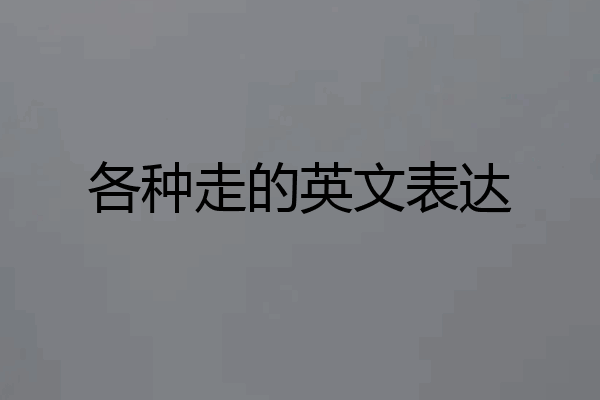
yiyiling1221
比较常用的有:go:走的统称,很多场合都适用。 walk:指“步行” run:跑 stagger:蹒跚而行,踉踉跄跄地走stride:大踏步地走等等


善美梅子
英语中有一些和“走”有关的动词,下面我们造句说明各种各样走路姿态之间的不同之处。这些动词如下:stagger,plod,pace,loiter,stride,stray,strut,ramble,lurk,creep,stroll,stumble,trudge,scramble,lurch,limp,prowl,crawl,march,rush1.Thedrunkardstaggered(蹒跚)fromthecoffeeshopandclungtoalamp-post.2.Thehitch-hikersreachedthetownafteralongwalkandplodded(重步行走)wearilytothehotel.3.Themanwhosewifewasexpectingthefirstbabywaspacing(踱步)nervouslyupanddownthehospitalcorridor.4.Afterclass,thechildrendidnotgohomedirectbutloitered(游荡)ontheway.5.Themanagerstrode(大步走)intotheofficeandaskedwhowaslateforwork.6.Thepuppystrayed(迷途)fromitshomeandwascompletelylost.7.Thecockisstrutting(昂头阔步)upanddownthefarmyard.8.Afterdinner,Iwentrambling(漫步)inthepark.9.Thethiefhasbeenlurking(潜行)inacornerforhisunsuspectingvictims.10.Notwishingtobenoticed,theboycrept(爬行)downstairs.11.Attheweekend,Tomandhisfriendswentstrolling(闲逛)inthetown.12.Inherhurry,themaidstumbled(绊倒)andfellflatonthefloor.13.Thefarmertrudged(艰难地走)homewithhishoe.14.Themountaineersscrambled(攀爬)upthehillside.15.Thecarlurched(摇摆不定)forwardacrossthegrass.16.Withoneleghurt,Johnlimped(跛行)home.17.Beastscomeouttoprowl(四处觅食)aftertheirpreyatnight.18.Beforebabiescanwalk,theycrawl(爬行).19.Thevictoriousarmymarched(迈进)intotheconqueredcity.20.Thepedestriansrushed(快步走)hereandthereintherain.